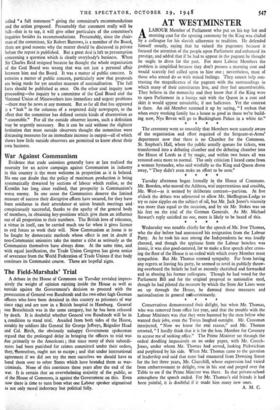AT WESTMINSTER
ALABOUR Member of Parliament who put on his top hat and morning coat for the opening ceremony by the King was chided by a colleague for his slavish adherence to tradition. He defended himself stoutly, saying that he valued the pageantry because it focused the attention of the people upon Parliament and enhanced its prestige, and added that if he had to appear in the pageant he thought he ought to dress for the part. For most Labour Members the problem is simplified because they don't possess a morning coat and would scarcely feel called upon to hire one ; nevertheless, most of those who attend do so with mixed feelings. They cannot help con- trasting the magnificence of the pageant with the surroundings in which many of their constituents live, and they feel uncomfortable. They believe in the monarchy and they know that if the King were to open Parliament in a lounge suit with the Queen in a coat and skirt it would appear unsuitable, if not ludicrous. Yet the contrast is there. An old Member summed it up by saying, "I reckon that when every working family has a house as good as those we're build-
ing now, Nye Bevan will go to Buckingham Palace in a white tie."
* * The ceremony went so smoothly that Members were scarcely aware of the organisation and effort required of the Sergeant-at-Arms' department now that there is no Chamber for the Commons. St. Stephen's Hall, where the public usually queues for tickets, was transformed into a debating chamber and the debating chamber into the House of Lords as if by magic, and within two hours all was restored once more to normal. The only criticism I heard came from a woman bystander, who said wistfully as the King and Queen drove away, "They didn't even make an effort to be seen." * * * * Tuesday afternoon began formally in the House of Commons. Mr. Bowden, who moved the Address, was unpretentious and sensible, Mr. West—as it seemed by deliberate contrast—partisan. At five o'clock the debate was adjourned to allow Mr. Skeffington-Lodge to try to raise ripples on the subject of oil, but Mr. Jack Jones's viscosity was more than equal to the occasion, and by six Mr. Stokes was on his feet on the trial of the German Generals. As Mr. Michael Stewart's reply satisfied no one, more is likely to be heard of this. * * * Wednesday was notable chiefly for the speech of Mr. Ivor Thomas, who the day before had announced his resignation from the Labour Party. As he took his seat among the Independents he was loudly cheered, and though the applause from the Labour benches was ironic, it was also good-natured, for to make a first speech after cross- ing the floor of the House is an ordeal with which every Member must sympathise. But Mr. Thomas scorned sympathy. Far from having any regrets at leaving his party, he seemed to revel in publicly throw- ing overboard the beliefs he had so recently cherished and forwarded and in abusing his former colleagues. Though he had voted for the Parliament Bill and for the original proposal to nationalise steel, though he had piloted the measure by which the State Air Lines were set up through the House, he damned these measures and nationalisation in general intliscriminately. * * * *
Conservatives demonstrated their delight, but when Mr. Thomas, who was removed from office last year, said that the trouble with the Labour Ministers was that they were haunted by the men below who wanted their jobs, even the Tories laughed outright. Mr. Crossman interjected, "Now we know the real reason," and Mr. Thomas retorted, "I hardly think that it is for the hon. Member for Coventry to accuse me of seeking office." The Prime Minister sat through the ordeal doodling impassively on an order paper, with Mr. Creech- Jones, under whom Mr. Thomas had served, looking Pickwickian and perplexed by his side. When Mr. Thomas came to the question of leadership and said that none had emanated from Downing Street for the last three years, Mr. Churchill, whose expression had varied from embarrassment to delight, rose in his seat and peeped over the Table to see if the Prime Minister was there. In that private-school atmosphere the speech ended. For Mr. Thomas's old friends it had been painful, it is doubtful if it made him many new ones.
A. M. C.


































 Previous page
Previous page